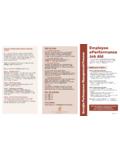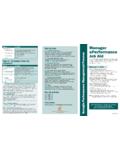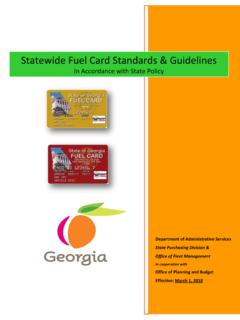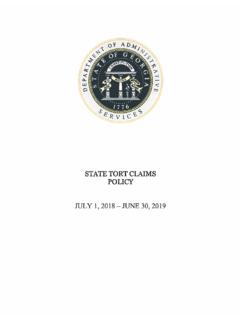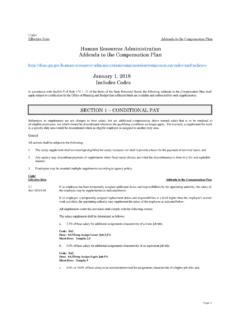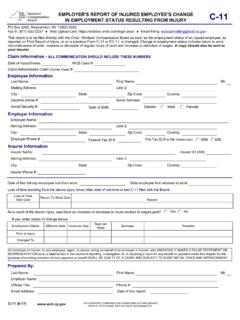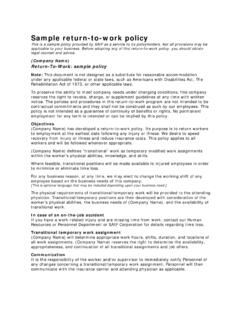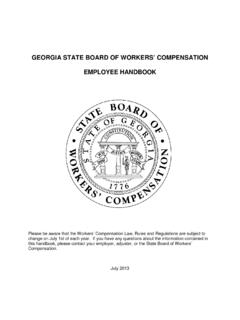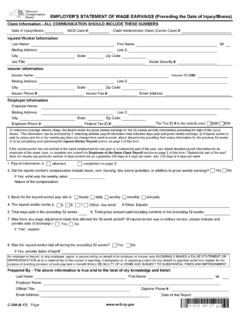Transcription of WORKERS’ COMPENSATION HANDBOOK
1 GEORGIA STATE BOARD OF WORKERS COMPENSATION employee HANDBOOK Please be aware that the Workers COMPENSATION Law, Rules and Regulations are subject to change on July 1st of each year. If you have any questions about the information contained in this HANDBOOK , please contact your employer, adjuster, or the State Board of Workers COMPENSATION . July 2013 Our Pledge to Employees If you are injured on the job, you have certain rights, benefits and responsibilities. Your employer also has obligations and responsibilities regarding all employees. The main focus of _____ is to assist job-related injured workers in receiving immediate and quality medical care, to administer workers COMPENSATION claims from the initial injury until the closing of the claim, and to safely return lost-time employees to productive employment. We believe that a healthy, safety conscious and productive company is the result of healthy, safety conscious and cooperative employees.
2 The staff of _____ understands an employee s and a family s concern when a wage earner is injured on the job and cannot work. We are here to help you through this difficult time. We pledge to give each injured employee individual attention. We pledge to handle your claim in a prompt and courteous manner. We pledge to fully inform you of all workers COMPENSATION income benefits you are entitled to receive and to pay these benefits to you in a timely manner. We pledge to pay all authorized medical expenses in a prompt and accurate manner. We pledge to make every effort to work with you in returning you to your regular job should your injury require you to lose time from work. _____ Company Name 2 State Board of Workers COMPENSATION Bill of Rights for the Injured Worker As required by law, ( ), this is a summary of your rights and responsibilities. The Workers COMPENSATION Law provides you, as a worker in the State of Georgia, with certain rights and responsibilities should you be injured on the job.
3 The Workers COMPENSATION Law provides you coverage for a work-related injury even if an injury occurs on the first day on the job. In addition to rights, you also have certain responsibilities. Your rights and responsibilities are described below. employee S RIGHTS 1. If you are injured on the job, you may receive medical, rehabilitation and income benefits. These benefits are provided to help you return to work. Your dependents may also receive benefits if you die as a result of a job-related injury. 2. Your employer is required to post a list of at least six doctors or the name of the certified WC/MCO which provides medical care. You may choose a doctor from the list and make one change to another doctor on the list without the permission of your employer. However, in an emergency, you may get temporary medical care from any doctor until the emergency is over; then you must get treatment from a doctor on the posted list. 3. Your authorized doctor bills, hospital bills, rehabilitation in some cases, physical therapy, prescriptions and necessary travel expenses will be paid if injury was caused by an accident on the job.
4 4. You are entitled to weekly income benefits if you have more than seven days of lost time due to an injury. Your first check should be mailed to you within 21 days after the first day you missed work. If you are out more than 21 consecutive days due to your injury, you will be paid for the first week. 5. Accidents are classified as being either catastrophic or non-catastrophic. Catastrophic injuries are those involving amputations, severe paralysis, severe head injuries, severe burns, blindness, or of a nature and severity that prevents the employee from being able to perform his or her prior work and any work available in substantial numbers within the national economy. In catastrophic cases, you are entitled to receive two-thirds of your average weekly wage up to the maximum allowed under the law for a job-related injury for as long as you are unable to return to work. You are also entitled to receive medical and vocational rehabilitation benefits to help in recovering from your injury.
5 If you need help in this area, call the State Board of Workers COMPENSATION at (404) 656-3875 or toll-free number (800) 533-0682. Your employer will advise you of the amount of your weekly benefit. 6. In all other cases (non-catastrophic), you are entitled to receive two-thirds of your average weekly wage but not more than the maximum allowed under the law for a job-related injury. You will receive these weekly benefits as long as you are totally disabled, but no longer than 400 weeks. If you are not working and it is determined that you have been capable of performing work with restrictions for 52 consecutive weeks or 78 aggregate weeks, your weekly income benefits will be reduced to two-thirds of your average weekly wage, but no more than the maximum allowed under the law, not to exceed 350 weeks. 7. When you are able to return to work but can only get a lower paying job as a result of your injury, you are entitled to a weekly benefit of not more than the maximum allowed under the law for no longer than 350 weeks.
6 8. Your dependent(s), in the event you die as a result of an on-the-job accident, will receive burial expenses up to the maximum allowed under the law and two-thirds of your average weekly wage, but not more than the maximum allowed under the law. A widowed spouse with no children will be paid a maximum allowed by law at the time of injury. Benefits continue until he/she remarries or openly cohabits with a person of the opposite sex. 3 9. If you do not receive benefits when due, the insurance carrier/employer must pay a penalty which will be added to your payments. employee S RESPONSIBLITIES 1. You should follow written rules of safety and other reasonable policies and procedures of the employer. 2. You must report any accident immediately, but not later than 30 days after the accident, to your employer, your employer s representative, your foreman or immediate supervisor. Failure to do so may result in the loss of the benefits. 3. You must accept reasonable medical treatment and rehabilitation services when ordered by the State Board of Workers COMPENSATION or the Board may suspend your benefits.
7 4. No COMPENSATION shall be allowed for an injury or death due to the employee s willful misconduct. 5. You must notify the insurance carrier/employer of your address when you move to a new location. You should notify the insurance carrier/employer when you are able to return to full-time or part-time work, and report the amount of your weekly earnings because you may be entitled to some income benefits even though you have returned to work. 6. A dependent spouse of a deceased employee shall notify the insurance carrier/employer upon change of address or remarriage. 7. You must attempt a job approved by the authorized treating physician even if the pay is lower than the job you had when you were injured. If you do not attempt the job, your benefits may be suspended. 8. If you believe you are entitled to income benefits and your insurance carrier/employer denies these benefits, you must file a claim within one year after the date of last authorized medical treatment or within two years of your last payment of weekly benefits or you will lose your right to these benefits.
8 9. If your dependent(s) do not receive allowable benefit payments, the dependent(s) must file a claim with the State Board of Workers COMPENSATION within one year after your death or lose the right to these benefits. 10. Any request for reimbursement to you for mileage or other expenses related to medical care must be submitted to the insurance carrier/employer within one year of the date the expense was incurred. 11. If an employee unjustifiably refuses to submit to a drug test following an on-the-job injury, there shall be a presumption that the accident and injury were caused by alcohol or drugs. If the presumption is not overcome by other evidence, any claim for workers COMPENSATION benefits would be denied. 12. You shall be guilty of a misdemeanor and upon conviction shall be punished by a fine of not more than $10,000 or imprisonment up to 12 months, or both for making false or misleading statements when claiming benefits. Also, any false statements or false evidence given under oath during the course of any administrative or appellate division hearing is perjury.
9 The State Board of Workers COMPENSATION will provide you with information regarding how to file a claim and will answer any other questions regarding your rights under the law. If you are calling in the Atlanta area, the telephone number is (404) 656-3818. Outside the metro Atlanta area, call 1-800-533-0682 or write the State Board of Workers COMPENSATION at: 270 Peachtree Street, NW, Atlanta, Georgia 30303-1299. A lawyer is not needed to file a claim with the Board; however, if you think you need a lawyer and do not have your own personal lawyer, you may contact the Lawyer Referral Service at (404) 521-0777. Willfully making a false statement for the purpose of obtaining or denying benefits is a crime subject to penalties of up to $10,000 per violation ( 34-9-18 and 34-9-19). 4 Workers COMPENSATION Questions and Answers GENERAL QUESTIONS Q. What is Workers COMPENSATION ? Workers COMPENSATION is a benefits program created by state law that provides medical, rehabilitation, income, death and other benefits to employees and dependents due to injury, illness and death resulting from a compensable work-related claim covered by the law.
10 Q. When am I covered? Workers COMPENSATION coverage begins the first day of employment. employers with three or more employees are required by law to provide coverage. Q. What is considered an on-the-job injury, illness and death claim? Any injury, illness or death arising out of and in the course of employment is by definition a compensable work-related claim. This means if employees are injured while performing assigned job duties during assigned work hours, they are covered under the workers COMPENSATION program. Injuries sustained while engaging in unassigned duties, during lunch and breaks, are not covered. In addition, injuries that occur during an employee s normal commute to and from work are not covered. Q. If I am injured on the job, what should I do? You should IMMEDIATELY report your injury to your employer. Obtain and fill out the paperwork required by your company and forward to the appropriate organization for processing. Be as specific as possible when reporting your injury.
